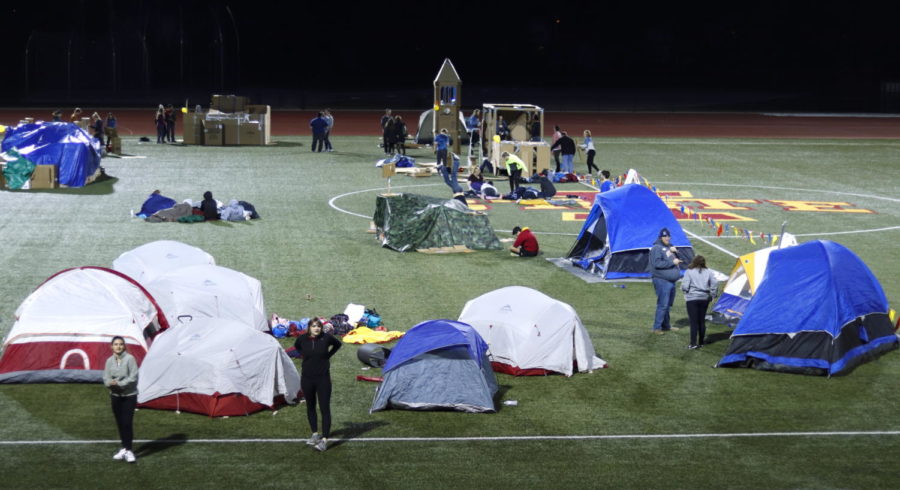College of Design to host symposium on homelessness
Iowa State students and Ames residents gather at the Cyclone Sports Complex on April 26 for Reggie’s Sleepout. Reggie’s Sleepout is named after Reggie Kelsey, a man who aged out of the foster care system in 2001 and found difficultly finding permanent housing before he was found dead in the Des Moines River three and a half months later. This event is to raise awareness and funding to support child and youth homelessness. The event features on-stage entertainment and a cardboard box building competition.
December 10, 2019
Iowa State’s College of Design will be hosting a symposium on homelessness Wednesday.
The ISU Homelessness Symposium is a one-day event examining the issues of homelessness in Iowa and around the country. The symposium combines the work of national experts on issues of homelessness and precarious housing with the on-the-ground knowledge of practitioners working on these issues around Iowa.
“The morning will include talks by national housing and homelessness experts Josh Leopold and Kimberly Skobba and panel discussions with local community leaders,” according to the College of Design website. “The afternoon will feature presentations by architecture, community and regional planning and civil engineering students in the ‘Contemporary Issues in Global Housing’ class and the documentary film screening and discussion.”
The symposium is free and open to the public, but attendees are requested to register online.
The schedule starts off with registration and breakfast from 8 to 8:30 a.m. on the second floor of the Scheman Building, which is followed by a welcome from 8:30 to 9 a.m.
Afterward will be a keynote by Josh Leopold from the Urban Institute and the panel “Housing Policy and Homelessness” from 9 to 10:45 a.m. in the Benton Auditorium of Scheman Building.
Leopold is a senior research associate for the Metropolitan Housing and Communities Policy Center at the Urban Institute in Washington, D.C. His work focuses on affordable housing policy and homelessness.
Leopold received a bachelor’s degree from Grinnell College in 2003 and a master’s degree in information science from the University of Michigan in 2005. From 2006 to 2011, he worked as an analyst for Abt Associates, where he was heavily involved in research regarding homelessness solutions. Before joining the Urban Institute in 2013, he was also the management and program analyst at the U.S. Interagency Council on Homelessness.
After a short break, the symposium will pick back up with a keynote by Kimberly Skobba from the University of Georgia and the panel “Homelessness Programs in Iowa” from 11 a.m. to 12:45 p.m. in the Benton Auditorium.
Skobba is an associate professor in financial planning, housing and consumer economics and director of the Housing and Demographic Research Center at the University of Georgia. Her research focuses on the housing needs of low-income families and the relationship between community development and social capital in rural and small towns.
After lunch, from 12:45 to 1:30 p.m. on the second floor of the Scheman Building will be “Case Studies on Addressing Housing Precarity” and student presentations from 2:15 to 4:00 p.m. in room 130 in the College of Design.
The day will round out with a film screening and discussion of “PUSH” from 4:15 to 5:30 p.m. in the Kocimski Auditorium, room 101 of the College of Design.
“PUSH” is a documentary on the global housing crisis by director Fredrik Gertten. The film screening is open to the public without registering for the symposium.
Panelists throughout the day include Angie Arthur, executive director of Polk County Continuum of Care; Eric Burmeister, executive director of the Polk County Housing Trust Fund; Marileigh Fisher, housing director for Community Housing Initiatives; Amber Lewis, homeless programs manager, Iowa Finance Authority; and Emily Osweiler, executive director of the YMCA Supportive Housing Campus in Des Moines.
Hosted by the College of Design with support from the Gordon Family Endowment, the symposium is organized by faculty in the Department of Community and Regional Planning.
These faculty members include associate professor Jane Rongerude, whose research focuses on the redevelopment of public housing and urban systems of poverty management; assistant professor Ted Grevstad-Nordbrock, who studies gentrification and the remaking of historic neighborhoods in college towns; and assistant professor Daniel Kuhlmann, who studies housing policy.
“It’s impossible to be interested in housing policy without interest in issues related to precarious housing situations and homelessness,” Kuhlmann said. “Organizers hope this symposium can identify new avenues for coursework, research, collaborative initiatives and future programming around homelessness.”







